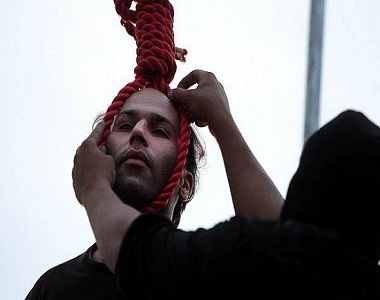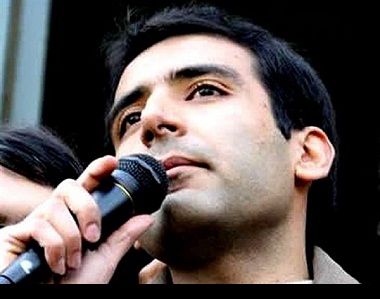“I will set myself on fire”

When Ahmad Ronaghi-Maleki speaks about his son, his voice shakes with emotion. He utters his name softly. But when it comes to the subject of Hossein Ronaghi-Maleki's imprisonment and the illegal treatment he has endured while incarcerated, Ahmad Ronaghi-Maleki’s tone changes. He is angry and determined. “They want to kill my son,” he shouts. “They want to turn him into another Sattar Beheshti.” Beheshti, a blogger and activist, who died in 2012 while in custody.
Now Ahmad Ronaghi-Maleki says he is willing to take drastic measures to draw attention to his son’s case. On March 2, he stated his intention to stage a sit-in outside the prosecutor’s office until he receives a response. “I will sit there wearing a shroud,” he tells IranWire. “I will bring gasoline and if they do not answer me, I will set myself on fire. If they try to prevent me, I will set them on fire as well.”
Blogger and activist Hossein Ronaghi-Maleki was arrested on February 28. He had previosusly been released from prison on September 3, 2014 after the Supreme Leader pardoned him on medical grounds. It was thought that he was in such poor health that that he would not live to serve out his sentence. But soon after his release, he was re-arrested.
In recent weeks, his father has contacted the prosecutor’s office and the prison warden, hoping to get further information about his son. He has called the judge in charge of the case, but has had no reply.
“They [the authorities] took Hossein for no reason at all,” Ahmad Ronaghi-Maleki says. “They even disregarded the Supreme Leader’s pardon. He was summoned to the prosecutor’s office under the pretext of a medical examination and was arrested. They accuse him of escaping his punishment. No matter how many times I tell them that he has been pardoned — and the prosecutors know this — they will not listen.”
After his latest arrest, Hossein Ronaghi-Maleki was sent to Ward 8 of Evin Prison. His father says the ward is unbearably cold, and that his son has gone on hunger strike to protest against prison conditions and his arrest. He says he is determined to continue his hunger strike until he is released. As of the last week of February, he was still on strike. “What difference does it make if I die by myself or I am killed?” Hossein Ronaghi-Maleki told his father over the phone.
Prior to his initial arrest in 2009, Hossein Ronaghi-Maleki blogged under the penname Babak Khorramdin, in honor of the 9th century Iranian freedom fighter who fought against Arab occupation. He studied software engineering at university and worked with the anti-censorship cyber group Iran Proxy, which enabled Iranians to circumvent government filters. Accordingto the Iran-based Committee for Human Rights Reporters, Maleki’s expertise was in computer programming; he was adept at setting up websites that navigated around government censorship and established ways to access blocked addresses. He was especially active in the aftermath of the disputed 2009 presidential election.
The Cyber Police unit of the Revolutionary Guards arrested Hossein Ronaghi-Maleki and his brother Hassan on December 11, 2009 at their father’s home. Both were taken to Section 2A of Evin Prison, which is controlled by the Revolutionary Guards, and put under intense physical and mental pressure to sign confessions. It was believed that authorities arrested Hassan Ronaghi-Maleki, who was not politically active, in order to force Hossein to confess. Hassan was released on bail after spending a month in solitary confinement, but Hossein remained in a solitary cell for a total of 13 months.
Maleki’s case was sent to Branch 26 of the Revolutionary Court presided over by Judge Pir Abbasi, who sentenced him to 15 years in prison for his cyber activities and for insulting the Supreme Leader, a verdict which was upheld by the appeals court.
“He suffers from kidney problems, intestinal hemorrhaging and an uncontrollable urination problem,” his father tells IranWire. Prior to his arrest, Hossein had begun suffering from kidney problems, but his condition worsened after he was subjected to physical abuse and prison authorities failed to offer him medical care.
Ahmad Ronaghi-Maleki says the family has been deceived. “They told me that if the doctor decided that the prisoner cannot withstand incarceration because of his medical condition, he would be pardoned. All the letters from the forensics team and prison officials have been presented. Despite this, he has been taken back to prison. I told them over and over that he needed medication and should not be detained, but they would not accept this, insisting that he had fled from his sentence illegally.” He insists that his son presented himself to authorities as soon as he was summoned via telephone. “We have given the prosecution a bail amount of 1.7 billion tomans [over $600,000]. But they will not budge.”
“Nobody in this country is accountable.”
When Hossein Ronaghi-Maleki was first arrested in 2009, authorities warned his father not to speak to the media. But now he feels he must talk. “I do not want to create headaches for my son,” he says, “but when nobody in this country is accountable and nobody hears me, I have to speak to the media. I call on all authorities to look into my son’s case.”
But authorities have told Ahmad and Hossein Ronaghi-Maleki that speaking to the media will not work. Khoda-Bakhshi, the assistant to the prosecutor, has said, “Many have died and what happened? At most the BBC and Voice of America make noise for a few days. And then it is over.”
Ahmad Ronaghi-Maleki says security agents have repeatedly issued death threats against his imprisoned son. “I know that they want to kill him; why else would they take him back to prison?”
The former blogger and prisoner is not yet 30; he has spent five years in prison. This is not the first time he has gone onhunger strike — there were fears for his life in 2012. Today, his health is fast deteriorating. “How can they behave this way?” his father asks. “Why, under the Islamic Republic? I plead with the Supreme Leader, with the head of the judiciary, with the prosecutor and MPs to look into my son’s situation.” Once again, he draws a parallel with the case of Sattar Beheshti. He bursts into tears and cannot continue.
“Hossein lost his kidneys in prison,” says Ahmad Ronaghi-Maleki. “Why don’t just they let us be?”


